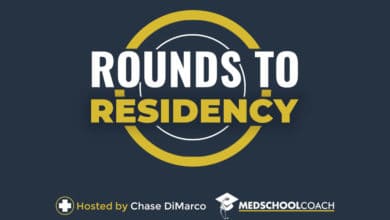Dr. David Rogers talks about why mentorship is important in medical school, tips for finding a mentor, and what to expect from the relationship.
- [01:10] Dr. Rogers’ Background in Education
- [02:55] How Mentors & Mentees Can Energize One Another
- [06:23] Mentorship Constellations or Networks
- [12:34] The Three-Person Team Mentorship Model
- [18:27] Developing a Good Mentor-Mentee Relationship
- [21:59] Finding a Mentor
- [28:28] Unhealthy Mentor-Mentee Relationships
The Mentor-Mentee Relationship
Dr. Rogers talks about the reciprocal nature of a mentoring relationship. A good mentor energizes – and is in turn energized by their mentees. Mentees must realize they are integral and valuable to the process. And mentors must take an interest in their mentees, knowing that it is a privilege to guide and spend time with them.
Finding a Mentor in Medical School
Especially during the times of COVID-19, it can be difficult to find a single mentor who is directly related to your interests and background. Dr. Rogers himself recalls struggling to find a mentor who was involved in teaching and education, which was his area of academic interest in medical school. Instead, he recommends expanding your idea of mentorship and seeking out a network, or a “mentorship constellation” of people from various backgrounds.
Dr. Rogers supports the three-person team mentorship model, consisting of the mentee, a peer mentor, and a senior mentor. The senior mentor should be contacted only several times a year and can help make big career connections. The peer mentor can work more closely with you. For example, they can provide advice on transitioning from medical school into residency.
Finding peer mentors does not have to be a formal task. Instead, you can ease into it without making an official request. You can also ask your dean for help in finding a peer who might be interested. For senior mentors, it is best to avoid asking them directly if they will be your mentor. Instead, ask something like “can I touch base with you a couple of times a year?” This increases the likelihood that the senior mentor says yes because they do not have to worry that you will be constantly pinging them.
Dr. Rogers gives several tips for developing a good mentor-mentee relationship:
- It is better if the mentee drives the relationship, such as setting up appointments or preparing questions,.
- The mentor should cultivate the medical ethic of beneficence and a strong desire to see their mentee succeed.
- The mentor should be transparent and should be willing to share their mistakes, as well as their successes. As Dr. Rogers says, “make your own mistakes. Don’t make mine over and over again.”
Dr. David Rogers is a Professor of Surgery and Pediatrics, Senior Associate Dean of Faculty Affairs & Professional Development, and Chief Wellness Officer for the School of Medicine at the University of Alabama Birmingham.
Sign up for a Free Coaching session with Chase DiMarco, sponsored by Prospective Doctor! You can also join the Med Mnemonist Mastermind FB Group today and learn more about study methods, memory techniques, and MORE!
